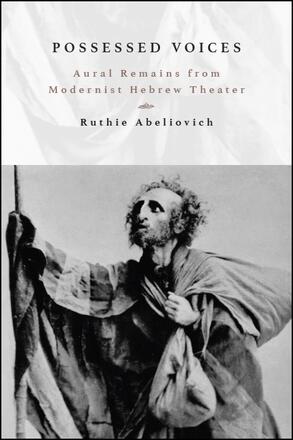
Possessed Voices
Aural Remains from Modernist Hebrew Theater
Alternative formats available from:
Analyzes audio recordings of interwar Hebrew plays, providing a new model for the use of sound in theater studies.
Description
Finalist for the 2020 Jordan Schnitzer Book Award in the category of Jews and the Arts: Music, Performance, and Visual presented by the Association for Jewish Studies
Possessed Voices tells the intriguing story of a largely unknown collection of audio recordings, which preserve performances of modernist interwar Hebrew plays. Ruthie Abeliovich focuses on four recordings: a 1931 recording of The Eternal Jew (1919/1923), a 1965 recording of The Dybbuk (1922), a 1961 radio play of The Golem (1925), and a 1952 radio play of Yaakov and Rachel (1928). Abeliovich traces the spoken language of modernist Hebrew theater as grounded in multiple modalities of expressive practices, including spoken Hebrew, Jewish liturgical sensibilities supplemented by Yiddish intonation and other vernacular accents, and in relation to prevalent theatrical forms. The book shows how these recorded performances provided Jewish immigrants from Europe with a venue for lamenting the decline of their home communities and for connecting their memories to the present. Analyzing sonic material against the backdrop of its artistic, cultural, and ideological contexts, Abeliovich develops a critical framework for the study of sound as a discipline in its own right in theater scholarship.
Ruthie Abeliovich is Lecturer in the Theatre Department at Haifa University, Israel.
Reviews
"The author's focus on historicizing and analyzing sound recordings and radio plays as a means to tackle the pervasive ephemerality problem in theater studies is a novel and valuable approach that represents a significant intervention in the field. These types of sources have had scant attention in theater studies to date, but Abeliovich makes a compelling argument that they belong at the center." — Debra Caplan, author of Yiddish Empire: The Vilna Troupe, Jewish Theater, and the Art of Itinerancy